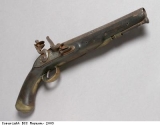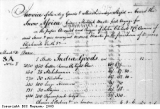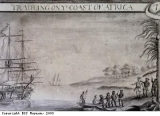Stories of Africans
African slaves are often seen simply as numbers rather than as human beings. Yet each slave had their own family history, their own skills and their own hopes and dreams. Every African forced onto a European slave ship had a story to tell. Here are some of their stories.
Olaudah Equiano was one such person. He was kidnapped in about 1755 and sold to slave traders. He was about 10 years old at the time. He was transported to the West Indies and then on to Virginia, in America. He was sold to a plantation owner there, but quickly resold to a British naval officer. He became his owner’s personal servant, and travelled with him. He was later sold to a plantation owner in the Caribbean. Equiano had been promised his freedom, but the promise was not kept. He was able to buy his own freedom, through saving money he had made by buying and selling goods. He was educated by two of his owners, and so learned to read and write and do arithmetic. The words written here are from Equiano’s autobiography, The Interesting Narrative of the Life of Olaudah Equiano, or Gustavus Vassa, the African. He wrote the book, published in 1789, to help the campaign against slavery.
“… One day when all our people were gone out to their works as usual, and only I and my dear sister were left to mind the house, two men and a woman got over our walls, and in a moment seized us both; and, without giving us time to to cry out, … they … ran off with us into the nearest wood. Here they tied our hands and continued to carry us as far as they could …
The next day proved of greater sorrow … yet … for my sister and I were then separated … it was in vain that we besought them not to part us; she was torn from me, and immediately carried away, while I was left in a state of distraction not to be described.”
John Jea was from Old Calabar in Nigeria. He was sold to a plantation owner in New York. He became a Christian, and was baptised. It was widely thought that baptism could free a slave, and Jea appealed to the local magistrates to free him. They did. He became a preacher and moved to Britain. His book, The Life, History and Sufferings of John Jea, the African Preacher, tells us little about his life. This collection of sermons and Christian thought was published in 1815.
“I, John Jea, … was born in the town of Old Callabar, in Africa, in the year 1773. My father’s name was Hambleton Robert Jea, my mother’s name Margaret Jea. They were of poor but industrious parents. At two years and a half old, I and my father, mother, brothers, and sisters, were stolen, and conveyed to North America, and sold for slaves.”
‘Granny Judith’ was a slave in America. Here her story is told by a relative, Richard Jones. Important personal stories such as these are part of many families’ histories. Stories are passed down from generation to generation. Granny Judith’s story was told to an oral history project in the 1930s. Slavery was abolished in the USA in 1865. People could still remember it 70 years later.
“Granny Judith said that in Africa they had very few pretty things, and that they had no red colours in cloth. … Some strangers with pale faces come one day and dropped a small piece of red flannel down on the ground. All the black folks grabbed for it. Then a larger piece was dropped a little further on, and on until the river was reached. Then a large piece was dropped in the river and on the other side. They was led on, each one trying to get a piece as it was dropped. Finally, when the ship was reached, they dropped large pieces on the plank and up into the ship till they got as many blacks on board as they wanted. Then the gate was chained up and they could not get back. That is the way Granny Judith say they got her to America.”
‘Gran Calina’ was a slave in America. His story was told to an oral history project by his granddaughter, Phoebe Gilbert, in the 1930s. The person who wrote down the story kept Phoebe’s way of speaking.
“Muh gran Calina tell me how he got heah. He say he playin on beach in Africa, an big boat neah duh beach. He say, duh mens on boat take down flag, an put up big piece uh red flannel, an all chillun dey git close tuh watuh edge tuh see flannel an see whut doin. Den duh mens comes off boat an ketch um, an wen duh ole folks come in frum duh fiels dey ain no chillun in village. Dey’s all on boat. Den dey brings um yuh.”
Some stories don’t even have a name to their voice. Their anonymity reminds us of the way slavery took away people’s identity. This was a story told by an un-named slave in 1831.
“They sold us for money, and I myself was sold six times over, sometimes for money, sometimes for a gun, sometimes for cloth … It was about half a year from the time I was taken before I saw white people.”





